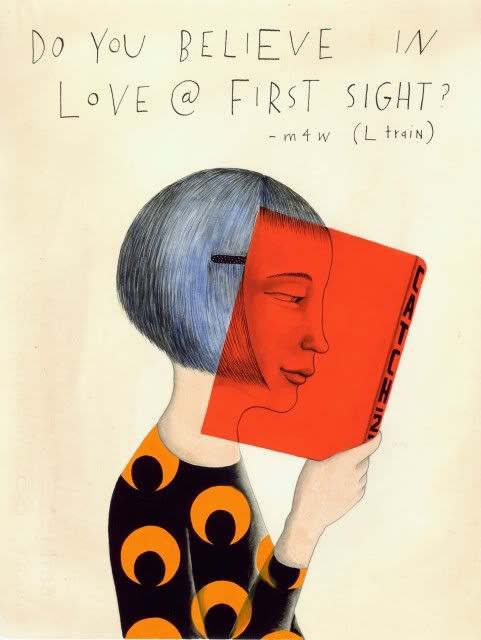 (image by Sophie Blackall from her 'Missed Connections' series)
(image by Sophie Blackall from her 'Missed Connections' series)The connections I notice between the three first novels I read in 2011 are the manuscript within the novel, family, love between siblings, a quest for a father, video games, creative use of fonts, and visceral, unexpected violence. Don't say I didn't tell you.
1. Invisible by Paul Auster. Like his in New York trilogy, a manuscript, or in fact two, play a vital roll in this novel - providing a voice from the past, or even the dead. It begins with the engaging story of a young poet and Columbia student, named Adam Walker in 1967, whose life changes when he makes the acquaintance of a French political science professor named Rudolf Born and his intriguing girl friend Margot. Before long Adam find his life enmeshed with theirs. By the end of the first section of the novel, a shocking event draws the reader in. I was riveted. The novel proceeds in three more sections, with other voices, spanning the rest of 1967, and subsequent events up to 2007, in New York, Paris and a remote island in the Caribbean. The book is about love, lust, family, mourning, justice, war, violence, the value of life and how a single event can change a life. Read it.
2. Luka and the Fire of Life by Salman Rushdie. This is a sequel (though it can be read separately) to the marvellous, or rather fabulous in every sense, Haroun and the Sea of Stories. This story is about the second son of storyteller Rashid Khalifa and his wife Soraya - Luka, who is born 14 years after Haroun. Luka has a dog named Bear and a bear named Dog, who are refugees from a circus where they were mistreated. Luka cursed the ringmaster, Captain Aag, aka Grandmaster Flame, upon learning about the state of the circus. The animals adopt his family when the circus subsequently burns down, and provide extra entertainment when his father is story telling. Luka, and Bear and Dog, get an adventure of their own, when his father falls into a deep, unrelenting sleep, and he inadvertently takes a step to the right to the World of Magic. There he meets Nobodaddy, who is Nobody, but looks like a ghost of Rashid, and who would reap his father's soul upon his death, unless Luka can steal the Fire of Life. From there, the novel proceeds like a fairytale quest, with Luka meeting various challenges and fabulous characters along the way including the elephant-headed ducks on the River of Time, the fearlessly rude Insultana of Ott, various Respecto-Rats, and other stealers of fire like Coyote or 'the Old Boy', Prometheus himself. There is all the wonderful wordplay you would expect from Rushdie, somewhat veiled political satire for the grown-ups, and a well-crafted tale for all, but the way the story is written to mimic a video game (à la 'Scott Pilgrim versus the Whole World'), complete with multiple lives and a counter that is the corner of Luka's field of view, did not resonate with me. Also, I love typography, so I think I am the sort who might appreciate the typographical games he plays with some of his gods and other mythological creatures. However, I thought having Ra the Supreme speak in Wingdings was a bit weak. The SPEdessa font employed for the 'Sumerian' dialogue of Anzu was better, as it was less recognizable and more plausible as cuneiform. However, I think that today, especially if one happens to be Salman Rushdie, and thus in the position to ask his publishers to humour him, one could have made the effort to actually print hieroglyphs, or at bare minimum, avoid characters which are so obviously unrelated to ancient Egypt (including icons for pencils or bombs and so forth). So, of the two novels which he has written more as fairy tales for children, I prefer Haroun and the Sea of Stories, but there is plenty to appreciate and enjoy here as well.
3. number9dream by David Mitchell. number9dream is also a quest for a father, but in this instance, 19 year old Eiji Miyake has come to Tokyo from his small, southern, island town, to find the father he has never met. As the story unfolds we learn how he and his twin sister Anju, were left by his ill-prepared mother to be raised by his grandmother and various uncles. His mother had escaped small town life to work as a 'hostess' in Tokyo, and became the mistress of a clearly powerful man, who anonymously paid support for his offspring. Eiji begins his quest by staking out the Panopticon building -where his father's lawyer keeps his identity- from the Jupiter Café, where he first spies the waitress with the perfect neck. He soon finds that discovering his father's identity will not be easy, but he makes connections with people who prove invaluable. The novel seamlessly combines reality, fantasy, dreams, video games, surreal cinema, past and present including WWII tales of an ancestor and a manuscript of fairy tales. The structure keeps you on your toes. The characters are excellent. Eiji Miyake will be with me for a long while; forthright, unworldly, brave and forgiving. The depiction of Tokyo, from capsule apartment, to Ueno train station Lost and Found, to love hotels, to computer hackers, to a harrowing yakuza underworld, is striking and vivid. It's excellent.
{Series so far: books read, more books read, books read, books read continues, more books read, I, II, III, IV, V, VI, VII, VIII, IX, X, XI, XII, XIII, XIV, XV, XVI, XVII, XVIII,XIX, XX, XXI, XXII, XXIII XXIV, XXV, XXVI, XXVII, XXVIII, XXIX, XXX, XXXI, XXXII, XXXIII, XXXIV, XXXV, XXXVI, XXXVII, XXXVIII, XXXIX, XL,XLI, XLII}









No comments:
Post a Comment